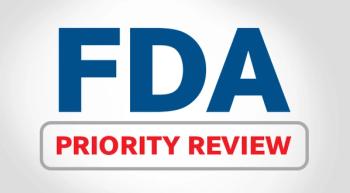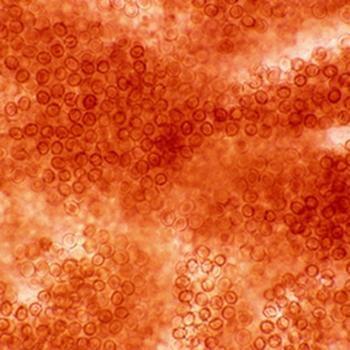
The Food and Drug Administration (FDA) expanded the approved use for Gilotrif (afatinib). The drug can now be used to treat patients with metastatic non-small cell lung cancer (NSCLC) who have uncommon EGFR alterations in L861Q, G719X and/or S768I.

The Food and Drug Administration (FDA) expanded the approved use for Gilotrif (afatinib). The drug can now be used to treat patients with metastatic non-small cell lung cancer (NSCLC) who have uncommon EGFR alterations in L861Q, G719X and/or S768I.

The Food and Drug Administration (FDA) granted a priority review designation to a novel version of Azedra (iobenguane I-131), a radiopharmaceutical, to treat patients with malignant or recurrent pheochromocytoma or paraganglioma (PPGL).

A four-drug combination, including Tecentriq (atezolizumab), Avastin (bevacizumab), carboplatin and paclitaxel, delayed progression or death by 38 percent in patients with advanced non-squamous non–small cell lung cancer (NSCLC), compared to those who were treated with Avastin alone.

The FDA has approved a novel breast-specific stereotactic body radiotherapy (SBRT) device known as GammaPod as a treatment for patients with breast cancer, based on findings from a 17-patient study.

The FDA has approved Perjeta (pertuzumab) in combination with Herceptin (trastuzumab) and chemotherapy as an adjuvant treatment for patients with HER2-positive early breast cancer at high risk for recurrence, based on findings from the APHINITY trial.

The FDA has approved Opdivo (nivolumab) as an adjuvant treatment for patients with completely resected melanoma with lymph node involvement or metastatic disease, based on findings from the phase 3 CheckMate-238 trial.

The FDA has approved Bosulif (bosutinib) as a first-line treatment for patients with Philadelphia chromosome-positive (Ph+) chronic myeloid leukemia (CML), based on findings from the phase 3 BFORE trial.

A stud presented at SABCS shows that IMMU-132, an antibody-drug conjugate, improves outcomes in women with heavily pretreated metastatic triple-negative breast cancer.

The combination delated progression or death compared to Avastin and chemotherapy alone, according to Roche, the manufacturer of the anti–PD-L1 and anti–VEGF agents.

Prevyis (letermovir) was granted approval by the Food and Drug Administration (FDA) to prevent cytomegalovirus (CMV) infection in adult CMV-seropositive patients treated with an allogeneic hematopoietic stem cell transplant (HSCT). The result is based on a significant reduction in CMV infection rates in a phase 3 study.

Calquence (acalabrutinib) was granted an accelerated approval by the FDA to treat adult patients with mantle cell lymphoma (MCL) following at least one prior therapy. The approval was based on objective response rates (ORR) in a single-arm trial.

The longest response rate lasted six months.

The risk of relapse dropped 53 percent when trametinib and dabrafenib were used after therapy.

Research announced at the Madrid conference could radically change treatment for lung cancer, melanoma and kidney cancer

The treatment paradigm for patients with advanced non-small cell lung cancer (NSCLC) is changing, as more emphasis is being placed on drug combinations and biomarkers, says Roy S. Herbst, M.D., Ph.D.

Vyxeos (CPX-351) was granted FDA approval for two subtypes of acute myeloid leukemia.

Idhifa (enasidenib) was granted approval by the Food and Drug Administration (FDA) today, for the treatment of patients who have relapsed or refractory IDH2-mutated acute myeloid leukemia (AML).

Blincyto (blinatumomab) was granted full approval by the Food and Drug Administration (FDA) to treat both children and adults with relapsed/refractory B-cell precursor acute lymphoblastic leukemia (ALL), regardless of Philadelphia chromosome (Ph) status, according to the developer of the anti-CD19 immunotherapy, Amgen.

ClearLLab multicolor reagents (T1, T2, B1, B2, M) gained approval from the Food and Drug Administration (FDA) to detect chronic leukemia, acute leukemia, non-Hodgkin lymphoma, multiple myeloma, myelodysplastic syndrome (MDS) and myeloproliferative neoplasms (MPN). This is the first approval the agency received for immunophenotyping on a flow cytometer.

JCAR017 had promising complete response and objective response rates in treating patients with diffuse large B-cell lymphoma (DLBCL) in a recently presented study.

Patients with squamous cell carcinoma of the head and neck (SCCHC) and those with melanoma saw some promising activity with the drug combination of epacadostat and Opdivo (nivolumab), according to findings from the phase 1/2 ECHO-204 study presented at the 2017 ASCO Annual Meeting.

Keytruda (pembrolizumab) showed promising signs of clinical activity for patients with advanced gastric or gastroesophageal junction (GEJ), according to updated findings from KEYNOTE-059 study that were presented at the 2017 American Society for Clinical Oncology (ASCO) Annual Meeting.

Progression-free survival was improved for postmenopausal women with HER2-negative advanced breast cancer when treated with Kisqali plus letrozole.

Axicabtagene ciloleucel (KTE-C19; axi-cel) was granted a priority review by the Food and Drug Administration (FDA) for the treatment of transplant-ineligible patients with relapsed or refractory non-Hodgkin lymphoma (NHL).

According to lead investigator Lillian L. Siu, M.D., the IDO1 inhibitor BMS-986205 had “best-in-class” activity for patients with advanced tumors in a phase 1/2a study.

Tagrisso (osimertinib) was granted a regular Food and Drug Administration (FDA) approval to treat some patients with lung cancer.

Multiple trials are testing the potential of immunotherapy combinations in breast cancer. The results are exciting, explains Elizabeth A. Mittendorf, M.D., Ph.D.

A recent phase 3 study showed that Imbruvica plus ublituximab may be a promising option for some patients with CLL.

More people with AML who were treated with Vyxeos were moved to transplant than those treated with a standard chemotherapy regimen, according to recent findings.

An independent data monitoring committee recommended that the phase 3 ADAPT trial exploring rocapuldencel-T (AGS-003) for the frontline treatment of metastatic renal cell carcinoma (mRCC) be stopped, but Argos Therapeutics explained that they will keep the trial open.